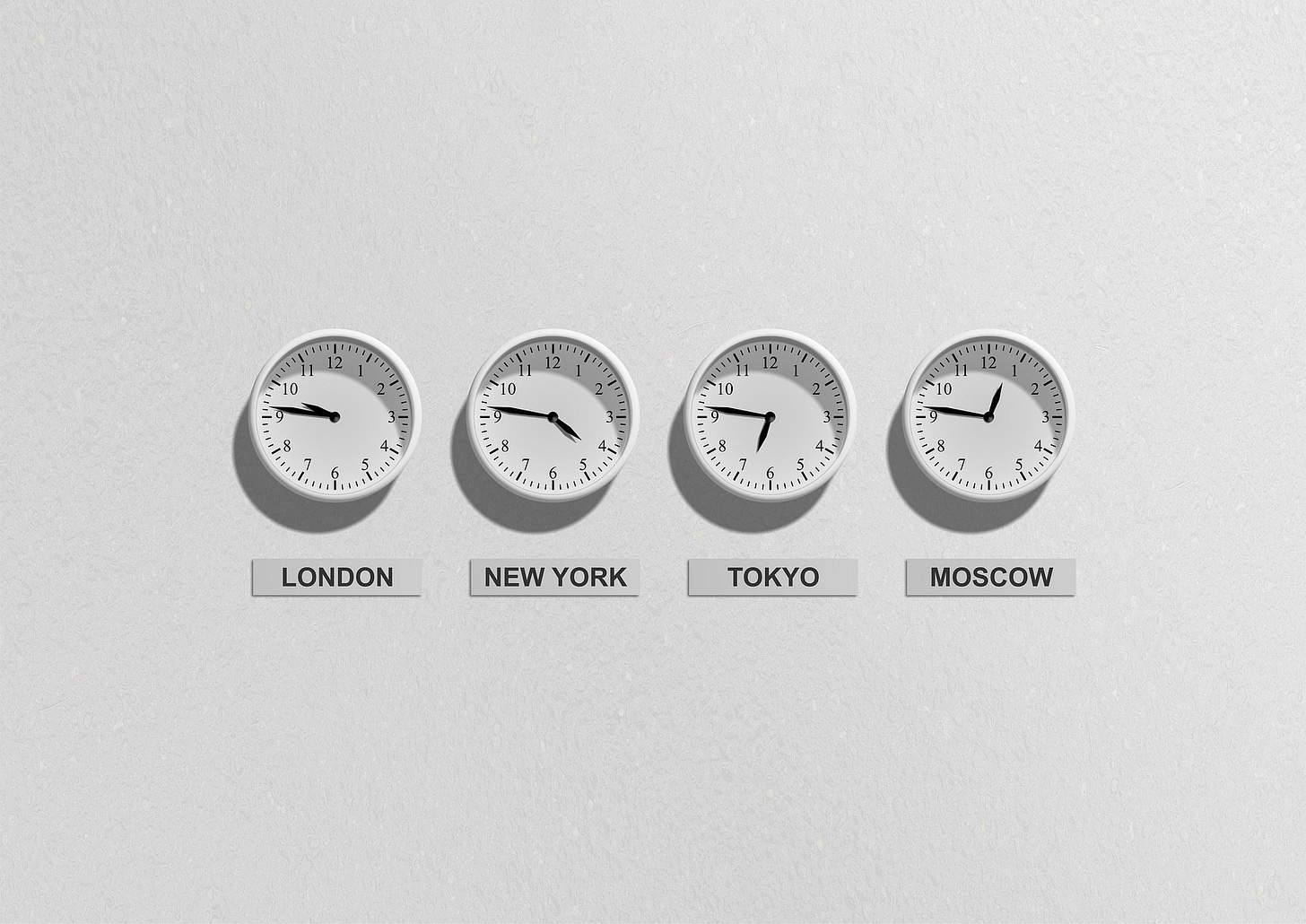The Great Divide 🗞️
Interesting Times #3
Kuala Lumpur, September 2024
Welcome to Vol. 3 of Interesting Times 🗞️! If you’re new, check out Volume 1 and 2 below ⬇️
Vol. 1
Vol. 2
TL;DR: We live in interesting times – marked by technological advances and polarization, social chaos, and a relentless news cycle of doom and gloom.
So what now? Embracing nuance, transcending status games, and cultivating a sense of optimism would be a start.
The Great Divide
It's 2024, and we're navigating choppy waters of division, where every conversation feels like a potential minefield. So let's pause for a moment and ask ourselves:
When was the last time you had a healthy disagreement that didn’t end with someone storming off in a huff, leaving behind a trail of ad hominem attacks?
Speaking of delightful… as much as I poked fun at the climate issue at the end of Vol. 2, I think it deserves another look:
Recently (you know, before the whole backpack around the world thing), I found myself in a conversation that escalated into a heated debate about how best to tackle climate change. As I watched my friends morph into caricatures of their political beliefs, I couldn't help but wonder: when did we lose the ability to disagree without vowing to never speak again?
Aren't we supposed to be unique individuals, not a bunch of clones in a sci-fi dystopia? I mean, if I wanted to hang out with the clones & corpo droids, I just go on LinkedIn.
Accel vs Decel
Today, these views don't fit neatly into the traditional spectrum of conservative and progressive that we usually use to understand our political choices. Instead, I believe that the world can be fundamentally divided into two camps – a new political tug-of-war, if you will:
Accelerationists vs. Decelerationists
"Don't go too fast," says one side, while the other retorts, "Get out of my way!"
"We need more government to fix this" vs. "We need Ozempic for government.” (Because who doesn’t want a slimmed-down bureaucracy?)
In other words, techno-optimists with a libertarian flair want to plunge headlong into change versus government-regulation simps who would rather keep things the way they are or, if at all, tread timidly into the deep waters of the unknown. As with any clash of diametrically opposed views, it’s like a slow-motion car crash where both drivers are convinced they're in the right lane.
Here's a familiar example: Think back to the last time you ventured into the realm of family IT support. Like a tech-savvy superhero, you unplug and replug things, read some online FAQs, only to find that you're only slowing down your parents' or grandparents' ability to Google things for themselves. As they become more resistant to things they don't understand -classic decel behaviour- you're just accelerating their dependence on you. But hey, it's all in the name of love, right?
Family frustrations aside, it doesn't take much to see the generational divide. While Millennials and Gen-Z -aka Digital Natives- are busy building careers in nouveau fields like UI/UX design and eagerly adopting every new gadget under the sun, the older generation is struggling to distinguish the password to their Gmail account from their device login, trapped in an endless loop of password resets. At least they're keeping busy, right?
And who can blame them? With technology changing so fast, we'll all be just as bewildered as we get older. Don't believe me? Just wait and see how some of us merge with machines while others choose to opt out to protect their "pure" analog biology. This leads me to believe that, just like our political views, where we fall on the accel/decel scale will change over time. As times change, our ability to adapt will shrink.
This divide isn't just about speed; it's about our relationship to change itself. And let's face it – change is always scary.
So I ask: Are we masters of our destiny, steering the ship through turbulent waters, or are we merely victims of progress, clinging to lifeboats as the Titanic of tradition sinks beneath the waves?
The truth, as is often the case, is most likely to be found somewhere in the messy middle – a place where we can acknowledge that both sides have valid points, even if they're often wrapped in opaque layers of self-righteousness. So next time you find yourself in a heated debate, remember: it’s not about winning or losing, it’s about finding common ground.
Gotta peel back the layers of the onion without crying, people. Come on now!
Politically Homeless
In times of stark pessimism versus optimism, many -dare I say, the silent majority- find themselves politically homeless. All too many of us have been convinced that the future is likely to be worse than the present (insert your personal flavour of Armageddon here).
Maybe that's why some look for salvation in tech messiahs, crypto bros, climate action, identity politics, or some other religion. A coping mechanism cornucopia.
Let’s think about what the future might look like. So here's a thought experiment:
A) There will be the development of benign superintelligence that will solve energy, climate, world peace, etc., perhaps even discovering new sciences and unlocking unknown realms of physics to usher in an age of abundance.
B) Society as we know it will collapse as we fight to the death over borders, ancient tribal conflicts, etc., catapulting us back into a dystopian, dictatorial, technocratic, all-seeing surveillance state, ushering in the Dark Ages 2.0.
Yeah… hopefully more of A and none of B, please.
When I do these kinds of thought experiments, I realize that extreme optimism and extreme pessimism are both really bad attitudes. In the limit, they're basically the same thing. It’s either “there's nothing you can do” or “the future will take care of itself”. All you get is analysis paralysis. Besides, I’m a believer in human agency, but If you had to choose, you’d probably go for somewhere between mildly optimistic/mildly pessimistic – you can’t have darkness without light.
So what if we think about the future differently?
The future is likely to be full of challenges, but I believe that human ingenuity will find a way to overcome them – just as it has for thousands of years. Think of how humans have accomplished such outrageous feats as landing on the moon, only to discover that it wasn't made of cheese. 🧀
The question now is, what will our modern moon landing look like?
Hot Take: Personally, I'd like to see a party with a visionary plan for the future that doesn't involve "de-growth to save tomorrow" or "taking our country back to a time that never was”.
Maybe what we really need is something like a "Make the Future Groovy Again" campaign.
In short, feeling politically homeless isn't just about feeling disconnected from existing parties; it's about longing for a vision that reconciles progress with preservation, innovation with stability. A tall order, I know.
Fight or Flight
Unfortunately, when faced with challenges that loom larger than ourselves, humans tend to either dig in or run away – fight or flight, right? At such moments, the political extremes can become increasingly alluring, like a siren's song to a shipwrecked sailor.
Nowadays, many feel that their lives are stagnating or getting worse, and who can blame them?
Take the U.S. for example: while the quality of life has improved for the "coastal elites," much of the heartland (that neck of the woods often characterized by a distinct hue of red - you get the idea) seems to have been left behind.
As easy as it may be to ridicule, remember: they have the same right to vote as you do. So perhaps we should strive to include them in the vision for the future, rather than ostracize them like the ancient Athenians (funny how even the founding fathers of democracy were not without their radical ideas). Food for thought.
Quiz time! What do you get when you combine the feeling of being forgotten with rising prices (inflation, anyone?) and stagnant wages? Here’s a hint: What happens when you feel that the social contract and the political class are no longer looking out for you?
Voilà, you’ve cooked up polarization and distrust of the establishment! It’s a recipe that’s been served up hot in every major industrialized nation.
In Europe, for example, the new boogeyman is immigration, which has now dethroned climate change on the fear-o-meter. And something unthinkable just five years ago -yes, increased defence spending- is ramping up as we speak.
And just like that, in the blink of an eye, tribalism is back in vogue. The weirdest things can happen after a pangolin lunch break in the Wuhan lab cafeteria…
Tough times make tough choices, and, unfortunately, every issue comes with its own set of divisive narratives. We ought to find one that works for all of us.
Interesting times ahead? It sure seems like it.
A Global Narrative
Here's a theory: The crux of our pressing global problems is that we lack an equally global story to address them.
Instead, we've got our heads stuck in our asses local, regional, or national narratives, even though our most pressing challenges transcend these (mostly fictional) boundaries.
Think climate change, the existential risks of artificial intelligence, global health crises (pandemics, anyone?), tactical nukes, growing economic inequality, declining birth rates, and whether XY chromosomes should be boxing XX chromosomes in the Olympics. You know… the big questions of our time.
On the one hand, we have Germany, passionately advocating a radical shift to renewable energy at the risk of deindustrialization (like risking your social life for a vegan diet). Meanwhile, emerging economies like India are pushing for rapid industrialization to lift their people out of poverty.
Will Germany’s “sacrifice” make a difference? And more importantly, which is the right path? Can we really blame nations for buying Russian oil and gas at bargain prices that the West has chosen to forgo?
Perhaps we should hope that everyone gets rich quickly enough to care about “luxury beliefs” that go beyond the immediate question of what to feed their families today. You know, is that gluten-free, organic, non-GMO quinoa salad really worth it, when you're just trying to survive?
Speaking of excesses, there's the U.S. and their software giants. Let’s face it – are they going to hit the brakes on AI development to ensure it’s aligned with humanity? Not a chance. And why would they if China isn't going to stop their efforts? Do we want to dominate or be dominated? In this arms race, staying ahead is the name of the game. It's like a never-ending game of musical chairs.
Unfortunately, as with any complex problem, there is no simple answer. Irrespective of the narrative we live in, we’re hurtling toward this new world whether we like it or not, and it's not like we can swipe left on reality.
Still, we could use a (mild) dose of optimism, don't you think?
At a Crossroads
So here we are at a crossroads – an intersection of opinions, where the binary trap of our polarized society pushes us to choose sides. As we wade through the relentless tide of information and ideology, one question looms large:
How do we navigate this landscape without losing our humanity – or worse, our sanity?
Here's an idea: In interesting times, perhaps the most radical act is to cultivate an interesting life. Yes, one that defies easy categorization and embraces the complexity of our world. It's about engaging with ideas that make our brains ache, seeking out perspectives that expand our horizons, and remembering that empathy is not a sign of weakness, but rather a superpower in disguise – cape not included.
Key Insight:
In a world obsessed with extremes, the most revolutionary act may be to live a life of nuance. The real challenge isn't choosing a team, it's transcending those divisions altogether.
If everyone is going to rush into adopting a group-think mentality, why not take the road less traveled?
Let's stop looking at the future with doom and gloom and come to terms with the fact that life is rarely black and white; it's more like a spectrum of possibilities with many shades of gray. And let's face it, if life were a painting, it would probably be one of those abstract pieces that leaves plenty of room for interpretation and plenty of room to question your life choices.
To be continued in Volume 4… Stay tuned, (maybe) the best is yet to come. 😉
Interesting Life
Welcome to the final installment of Interesting Times, Interesting Life! You can check out Vol. 1, 2 and Vol. 3 below ⬇️
Thanks for reading! The Interesting Times, Interesting Life series is a culmination of previous ruminations.
Feel free to check them out! Look out below ⬇️











